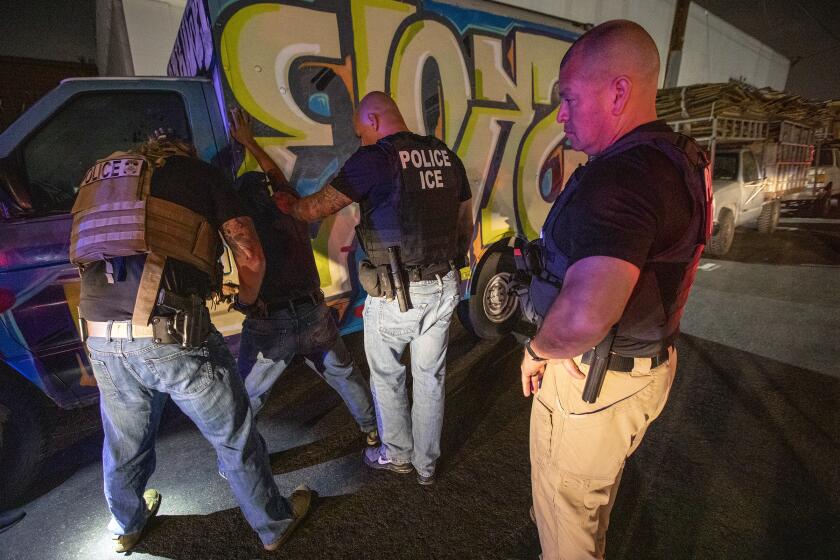What happened when L.A. foster youth made a short film? They got to go to the White House
- Share via
Jevonne Davis was in the fifth grade when his life changed. After a childhood spent bouncing from home to home, he met his new foster mother in Compton — and she took him to the theater.
The child was transfixed by the actors onstage, by the dancing, the singing, the sheer creativity. He leaned over and whispered to his foster mom: “I want to be part of this.”
Davis is 18 now, a veteran of the stage and screen. Last week, he and two fellow Los Angeles County foster youths were honored at the White House’s inaugural South by South Lawn festival for a short film they starred in, wrote and directed.
The film they made this summer, called “Time for Change,” was a finalist in the White House Student Film Festival, one of more than 700 entries. The students, selected by the Los Angeles County Department of Children and Family Services, worked with Kids in the Spotlight, a Burbank nonprofit that teaches young people filmmaking skills.
The short film, which is set in the future, depicts a roundtable meeting of people from different centuries who are asked what kind of world in which they want to live.
Davis — who had acted in eight plays by the time he reached his freshman year at Ánimo Watts College Preparatory Academy in South Los Angeles — played Thomas Jefferson’s son in the short film.
“In the world I want to live in, all men should be treated like they are created equal, to paraphrase my father,” Davis’ character says.
Davis, who is now a freshman at Cal State Fullerton, said the experience of being a young African American man who played a president’s son onscreen and got to meet President Obama in person was humbling.
“Foster youth, you know, they don’t always have a place to share their voice,” he said. “It’s like, wow, I can’t go back. I just have to continue to do better, continue to go forward.”
Davis hopes to star on Broadway, or maybe on television or even the silver screen. But he has another goal too.
“For me to be satisfied with life before I leave this Earth, I want to open up my own acting school for foster youth and give back because I saw what it did for me,” he said.
Angel Marie Velasquez, who just started her freshman year at Cal State L.A., plays a medieval peasant woman.
Her character’s dream for the future?
“I want to own the castle, not have to clean it,” she says. “Maybe I can teach my daughters to want more for themselves.”
Velasquez, 18, said she was born with drugs in her system and has been involved in the county’s foster care system since she was an infant. Her grandmother raised her in East Los Angeles, and she was a high school honor roll student.
The White House honor, she said, has her entire family, even those who weren’t always there, rallying behind her.
“I’m starting to have everyone in my life now,” she said.
Leanne Elizabeth Caldejon, 18, said she played the stereotype of a young millennial woman in the film. She showed up late for the futuristic meeting, clutching a cup of coffee.
“Sorry I’m late. My Uber driver got lost, but I’m here,” she says walking in, staring into her cellphone.
When asked what kind of world she wants, she says, “I want to advocate for youth like me so they can be who they want to be.”
Caldejon said the role hit home for her. It often feels like young people are not taken seriously and they don’t feel they have the power to speak up, she said.
Caldejon entered the foster care system at 14 after running away from home, fleeing verbal and physical abuse, she said. At one point, she said, she was choked by a relative, and she was berated if she got a bad grade in class. She just stayed quiet to avoid a fight, she said.
“I just felt like I was the Cinderella of the house,” Caldejon said. “I didn’t feel like I was part of the family.”
When Caldejon was placed with her foster family in Pico Rivera, she found her “actual home,” she said.
Caldejon — who said she was “self-sufficient,” working at an ice cream shop as a teenager — moved out of her foster home at 18 because the family could take only two kids at a time and she wanted another child to get to live with her foster parents. She now lives in her own apartment as part of the Department of Children and Family Services’ program for non-minor dependents in extended foster care.
She is double-majoring in social work and law at Cal State L.A. and hopes to become a lawyer for foster youth.
“I want kids like me to learn they have a voice,” she said, choking up. “Just because they’re in foster care doesn’t mean they have no chance in life.”
Twitter: @haileybranson
ALSO
Rapper Coolio charged with felony after loaded gun is found in his bag at LAX, authorities say
More to Read
Sign up for Essential California
The most important California stories and recommendations in your inbox every morning.
You may occasionally receive promotional content from the Los Angeles Times.











